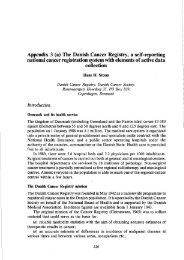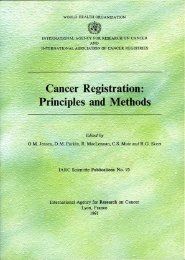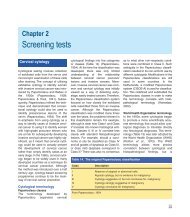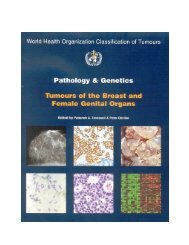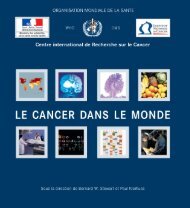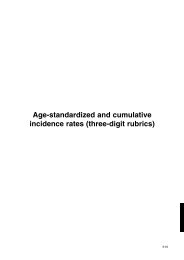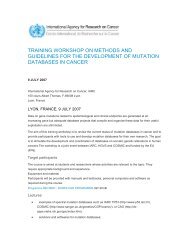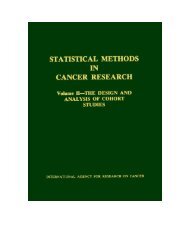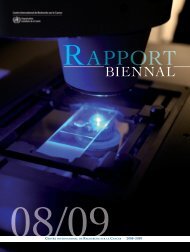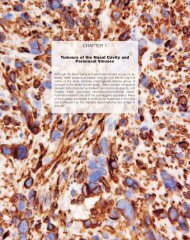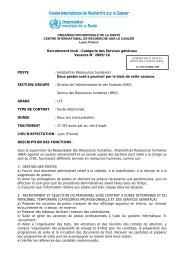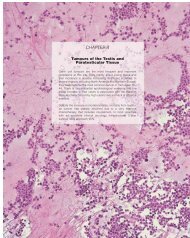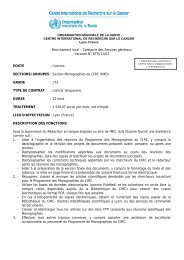world cancer report - iarc
world cancer report - iarc
world cancer report - iarc
You also want an ePaper? Increase the reach of your titles
YUMPU automatically turns print PDFs into web optimized ePapers that Google loves.
SCREENING FOR COLORECTAL CANCER<br />
SUMMARY<br />
> Faecal occult blood test (FOBT) is the<br />
most cost-effective and comprehensively-applicable<br />
screening method available,<br />
but its specificity and sensitivity<br />
are limited.<br />
> Endoscopy provides the best method for<br />
detecting colorectal <strong>cancer</strong> and its precursor<br />
lesions, e.g. polyps. However, its<br />
application to population-based screening<br />
is limited by cost and availability of<br />
qualified specialists.<br />
> For individuals at average risk in developed<br />
countries, screening may be recommended.<br />
Colorectal <strong>cancer</strong> is one of the few internal<br />
<strong>cancer</strong>s that are amenable to secondary<br />
prevention, that is, prevention by detection<br />
of preclinical lesions. A small proportion of<br />
colorectal <strong>cancer</strong>s occurs among those with<br />
a family history of the disease. The main aim<br />
of screening is to detect the 90% of cases of<br />
colorectal <strong>cancer</strong> that occur sporadically,<br />
most of these in patients above the age of<br />
50. The precursor of advanced colorectal<br />
<strong>cancer</strong> is either an adenomatous polyp or a<br />
flat neoplastic area (Fig. 4.40). In order to<br />
prevent premature deaths, people aged 50-<br />
Registry<br />
69 years, among whom 35% of incident<br />
cases occur, are the main focus of attention<br />
(Table 4.15). Older age classes account for<br />
60% of cases in developed countries,<br />
colorectal <strong>cancer</strong> being of relatively minor<br />
concern in developing countries. Simulation<br />
studies [1] conducted in the USA suggest<br />
small variations in cost and results with different<br />
strategies. The gain in life expectancy<br />
per person screened is small (1-4 weeks),<br />
but the benefit is great for the 5% destined<br />
to have <strong>cancer</strong>.<br />
The faecal occult blood test<br />
Screening by the faecal occult blood test<br />
(FOBT) is currently considered the optimal<br />
screening strategy in terms of cost-effectiveness.<br />
FOBT identifies persons at risk,<br />
though falling short of being definitive for<br />
<strong>cancer</strong> [2-7]. Guaiac resin-based slide<br />
Number of cases (%)<br />
Total 0-49 yrs 50-69 yrs 70-85+ yrs<br />
Osaka Cancer 8,051 1,016 (12.6%) 3,849 (47.8%) 3,185 (39.5%)<br />
Registry, 1987-89<br />
Denmark Cancer<br />
Registry, 1989 3,222 180 (5.5%) 1,146 (35.5%) 1,896 (58.8%)<br />
Norway Cancer<br />
Registry, 1996 2,910 140 (4.8%) 954 (32.7%) 1,816 (62.4%)<br />
Table 4.15 Age at diagnosis of colorectal <strong>cancer</strong> in Japan and Scandinavia, both sexes.<br />
A B C<br />
Fig. 4.40 Endoscopic features of (A) polypoid (B) slightly elevated and (C) flat adenoma of the colon.<br />
tests indirectly measure haemoglobin levels<br />
in the faeces by the determination of<br />
peroxidase activity (Fig. 4.42). When a<br />
drop of water is added to the slide (i.e. the<br />
slide is rehydrated, as opposed to being<br />
non-hydrated) the test has been found to<br />
be more sensitive, although at the<br />
expense of a higher false positive rate. A<br />
false positive result to the guaiac resin<br />
reaction occurs after ingestion of dietary<br />
haemoglobin or peroxidase-containing<br />
foods. Between trials there is considerable<br />
variation in quantitative findings.<br />
Generally however, the test should be positive<br />
in no more than 2% of those<br />
screened. The sensitivity of the test is<br />
around 50% for <strong>cancer</strong> (of all screened<br />
persons who have <strong>cancer</strong>, 50% will be<br />
detected) but is low for polyps, at around<br />
10%. The predictive value of a positive test<br />
Screening for colorectal <strong>cancer</strong> 163



